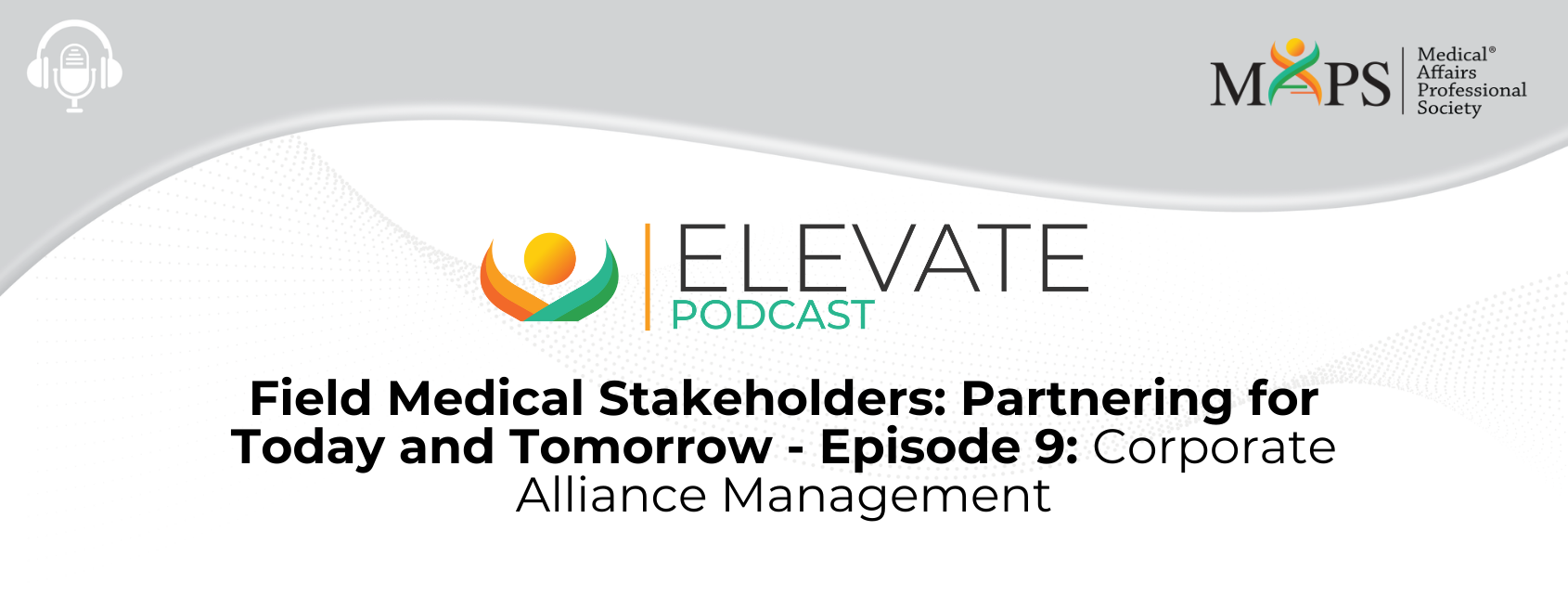Objectives
At the end of this series of podcasts, the participant should be able to:
· Discuss the functions and activities of key internal partners
· Identify potential areas for compliant collaboration by MSLs with key internal partners

MODERATOR: Kathryn Gann, PhD

INTERVIEWER: Robert Groebel

SPEAKER: David Kriesel, PharmD
Following is an automated transcription provided by otter.ai. Please excuse inaccuracies.
Kathryn Gann 00:00
Welcome to the Medical Affairs Professional Society Field Medical Focus Area Working Group’s podcast series, entitled “Field Medical Stakeholders: Partnering for Today and Tomorrow.” In this ninth podcast, we will discuss corporate Alliance management. I’m Kathryn Gann and I’ll be moderator for this podcast. I serve as a member of the field medical focus area Working Group. Currently I’m an independent consultant in Medical Affairs. Having spent my 30 year career as an MSL, an MSL manager, and an MSL trainer. Our legal disclaimer is as follows. The views expressed in this recording are those of the individuals and do not necessarily reflect on the opinions of MAPS or the companies with which they are affiliated. This presentation is for informational purposes only, and is not intended as legal or regulatory advice. We encourage you to engage in conversations about partnering with field medical stakeholders with other MAPS members by the community portal on the MAPS website. Simply log in with the email address and password associated with your MAPS account and click on the discussion tab. Then scroll down to field medical to post a question or to review previous postings. The objectives for the series of podcasts are that at the end of the series, the participant will be able to one discuss the functions and activities of key internal stakeholders and to identify potential areas for compliant collaboration by msls with key internal stakeholders. I’d like to thank today’s panelists for sharing their subject matter expertise with the MAPS membership. Speaking today are Robert Groebel, vice president global medical strategy at Monocl. Robert’s going to be our interviewer. And David Kriesel, currently an independent consultant and formerly the vice president corporate alliances at Cosmo pharmaceuticals. So David’s going to be our interviewee to kick us off, Robert, could you please briefly provide some information about your current position? how long you’ve been in industry, and then take it away?
Robert Groebel 02:06
Thanks, Kathy. Yeah, Robert global. I’m the Vice President of medical strategy at Monocl. I’ve been in the life sciences for over 25 years now. started my career in commercial medical roles at Behringer Ingelheim, transitioned into opportunities at Shire, and then recently have transitioned into the software space and I work with Medical Affairs, to build out strategies to better understand the therapeutic areas they’re in, generate insights and improve the way they engage with stakeholders externally. So I’ll turn it over to David. David, can you give us a little background on your career? And and then we can transition into corporate Alliance management?
David Kriesel 02:46
Yeah, thank you, Robert. I appreciate the introduction. And I’ve also had a lengthy history of in the pharmaceutical industry. I started out as a pharmacist many years ago and spent the last 20 years in the industry, starting out as a medical science liaison for Bristol Myers Squibb. And then transitioning from there after going into field management, to other pharmaceutical companies, both large and small, throughout the last 15 years, had the opportunity to do a variety of different functions. I really enjoy managing and directing MSL teams and other home office Medical Affairs activities. And then my latest foray with Cosmo pharmaceuticals, was VP of corporate alliances. And that’s what we’re here to talk about today.
Robert Groebel 03:33
Right? So can you tell us what corporate Alliance management does?
David Kriesel 03:38
Yeah, it’s it’s an interesting role. I think within a pharmaceutical or actually multiple industries have this type of role. With corporate Alliance management, you’re really the liaison between two corporate entities. Once two companies form a partnership, you can either sell or develop, go promote products or products, there needs to be some sort of consistent communication. Between the two companies, what happens is there’s a contract that sign that includes all of the agreements that go along with that court, the product promotion, or development. And it’s important to make sure that you’re monitoring all of the components within that contract. And so that, in order to be able to do that, you need to have someone in place within Alliance manager or team of people that then communicates with the other company works with them, to ensure that all the commitments are being met. And the things the attention is being paid in the appropriate ways to the products that you’re co developing or promoting.
Robert Groebel 04:40
Understood. So So how was this function structured within your organization? Where did it sit? And how did it report?
David Kriesel 04:50
That’s really a standalone department, at least in my experience, and the structure of the department was fairly small in my situation, it can be a lot and others. So the V, I was the VP that the head of the department, so VP of corporate alliances, I also had a Director of Corporate alliances that that reported to me. But we all really had our own contacts with the other between the other pharmaceutical companies. And we’re responsible for maintaining those relationships.
Robert Groebel 05:21
Understood. So who were your main customers within your organization?
David Kriesel 05:27
Like I said, it’s a very interesting role, I think, to take on. And because it does, you get the chance to really interact with many different people and different groups within an organization. So that could be anywhere from, you know, the heads of the marketing department that has a sales facility that dealing with the top people in the departments. And they’re responsible for the deliverables and expectations between companies. So it’s marketing, sales, manage markets, it could be of course, Medical Affairs is in there.
Robert Groebel 05:57
The legal department, there’s really interesting conversations and interactions you have with all of these types of people. Interesting. So when you think about your, your entrance into the pharmaceutical space as part of your career, how did your role as an MSL begin to prepare you for a job like this? or How are you able to leverage some of the skills you used as an MSL to do this job so effectively?
David Kriesel 06:25
That’s a great question and very pertinent for our discussion today. And one of the great things about I think, being an MSL working in Medical Affairs, both field medical and home office, Medical Affairs, you’re really integral to the field base operations. And you’re integral to many home office type of functions and operations and committees. And so by spending time, really working in the field, understanding how the other field based groups work, understanding the responsibilities of your home office departments, and how they all interact to create a successful situation. For product development, or product sales, is all critical for corporate Alliance management. Once again, you’ve entered into a legal agreement that has delineated responsibilities between companies. And the best way to understand if these responsibilities and objectives are being met, with the appropriate amount of efforts backing, both financial and personnel, and are the efforts being really put in the right direction. That’s all critical, and goes back towards the experiences you have throughout your career as a field based liaison, and home office experiences as well. So it’s really the totality of operations within a pharmaceutical company, all come together to make sure that once again, each company is supporting their own end of their agreements, and promotion of a product.
Robert Groebel 08:03
Interesting. Now, did your responsibilities reach beyond, let’s say, the US in scope? And were you involved in alliances that were more global in nature? And are there any differences or subtleties to that type of work?
David Kriesel 08:19
Well, in my specific situation, my contacts and responsibilities, were all US US based companies. Well, I can change that slightly, and that the responsibilities that I that I had to deal with were all promotion and development within the United States. So some companies can span of course, as we know, there are many global companies out there. So that’s a little outside of my area of experience, but without a doubt, as there are, you know, sign agreements and responsibilities that extend beyond our borders, there certainly will have to be communication with this similar type of role just more on a global scale.
Robert Groebel 09:05
Understood and you you look at the amount of collaboration mergers and acquisitions in these types of agreements that are going on, you know, from development all the way to commercialization, are there are there any recommendations you might give to a field medical team as to how they can best work and support the efforts of of corporate alliances.
David Kriesel 09:28
Without a doubt the MSL role, plays a critic plays a critical role, I should say, in the completion or execution of many of the aspects of the agreement. When you look at product development, it could be assisting with the completion of a clinical trial in a specified period of time. It could be working on making sure that patients have on a market of product working Sure, working to ensure Patients have access To have their medications covered by political awareness within managed markets and partnering with the Manage markets group. There are sometimes certain requirements for having field based medical communication through the numbers of MSL that are required, you know, in an agreement. So there are the MSL, over the years has really developed into a vital member of the field of pharmaceutical company and field based teams. And when he just looked out and you can but you know, every company can be a little bit different on how they utilize those, those skill sets. But certainly, many of the operators, many of the things that an MSL does in the field can be directly linked back to parts of an agreement between two cooperations
Robert Groebel 10:47
interesting, you know, I look back at my time in the industry where I was involved with with CO marketing or co promotion types of agreements. Are there are there any things you might point to that, that really ensures good collaboration across companies and things for people to think about to to really ensure you’re driving you know, forward in a unified manner? recognizing that there are two corporate cultures and rules may be different.
David Kriesel 11:15
Yeah, that things can become very, very complicated. And I think this is an area that you know, MSL and MSL background can really assist. And it’s all around communication and visibility of what you’re working on. And so MSL themselves become excellent communicators, excellent deliverers of information, and build strong working relationships is key to a successful MSL. And so that those exact skills can be transferable in many different situations. And corporate Alliance management is certainly one of those. It’s forming those working relationships, open communication, being able to set specific expectations, not only around, of course, what the agreement is, but how often you’re going to communicate. What’s what do you need to communicate, to gain understanding of the current situation between the companies and what’s being worked on? All of those things? Are you kind of get trained out I think, as an MSL? And so it’s a complicated kind of partnership sometimes. But keeping open communication, scheduling regular meetings, and really knowing getting to know your partners, and the requirements of the agreements are critical for success.
Robert Groebel 12:45
Excellent. I mean, recognize this a lot. So last question for David, recognizing that you started your your pharma career as an MSL, is there anything you know, when you look back on on your time as an MSL? Or an MSL manager? Is there anything in your career there that kind of puts you on the path to become someone who is going to be a leader of corporate alliances?
David Kriesel 13:09
So the interesting question that in retrospect, in retrospect, I would have to say, I had no idea that I’d end up you know, doing that. But I do think, though, that keeping it open, one of the great things about working in the pharmaceutical industry and, and working in medical and scientific affairs, is that we keep an open mind, and you really have the opportunity to take on many different roles as you as you progress through your career, and keeping that open mind and not being afraid to step outside of your comfort zone. taking on new things that you can learn about, you know, talking to a lot of people in different departments within an organization, then you start to learn about these these kind of unknown areas, at least they were an unknown to me when I first started out, and so really happy to get that experience. And I just think, following those basic tenants of, of how you operate on a day to day basis will hopefully continue to open doors for you as you continue along your career.
Robert Groebel 14:11
Yeah, that’s great. I really appreciate that. I mean, my career kind of reflected the same, the same path. I mean, starting out as a sales rep in the early 90s, I’d never thought that I was going to end up being, you know, kind of in a senior leadership role at Medical Affairs. And, and to your point, it was about keeping an open mind, you know, taking chances being curious. And so I think it’s, I think that’s terrific feedback for anybody listening. Great. Thanks very much for all the time today, David.
David Kriesel 14:41
And thank you for having me. I appreciate it.
Kathryn Gann 14:44
So, Robert, and David, I want to thank you both for participating today. I found some very interesting tidbits in what you were saying, David, the idea that corporate Alliance management is a liaison between two entities and as you said, This is what I’m myself do. We form relationships, we nurture relationships, we figure out how to keep them moving, how to meet the needs. We’re good about communication. You also said that and what I really liked because I think it relates back to why we are doing this series, you said it’s very important to understand how other departments work within a company and within your own company and even within another company. And that’s really why we are doing this series to give our MSL the opportunity to hear from people like you that they may hear about corporate Alliance. But well, what do they do? How do we I don’t understand what they do. So thank you, thank you for helping us meet our goals here. So that our MSL is have a better understanding of the function of corporate Alliance, and how they can interact compliantly with that group, really by their day to day job by what they do. So again, thank you very much for all of that. So this has been our ninth podcast in the series on the topic of field medical stakeholders Partnering for today and tomorrow. If you are a MAPS member, thank you for your support of MAPS. If you’re not yet a MAPS member and would like access to additional resources in this area, please visit the MAPS website to explore joining and that website is Medical Affairs.org forward slash membership. This concludes the podcast



